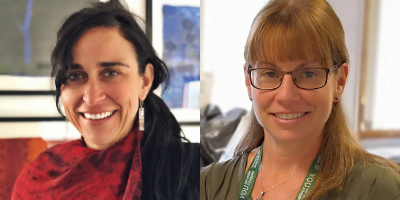Marine
Food and Drink Fortnight – Spotlight on Women in Scottish Aquaculture
September 7, 2020 by Marine Scotland Communications No Comments | Category Aquaculture
For Food and Drink Fortnight Marine Scotland is putting the spotlight on the seafood sector and how people have adapted their ways of working in light of the coronavirus (COVID-19) pandemic.
In the second part of this series we hear from the new co-chairs of the Women in Scottish Aquaculture (WiSA) Teresa Garzon (above left) and Rowena Hoare (above right) who explain how they have led the group through these challenging times.
What challenges have women working in aquaculture faced during the pandemic?
Many women have been trying to juggle work and childcare whilst working from home. In many instances even home schooling which can be time consuming and challenging! Others have been put on shift patterns to accommodate social distancing at farm sites e.g. one week on one week off, which leaves the partner who remains at home without support. Many researchers’ work halted overnight as laboratories were shut and it was not possible to go sampling in the field, resulting in many people being put on furlough. In addition, all face to face networking events were cancelled or postponed. Indeed, these situations were the case for many people, not only women. However, in some cases default expectations continue to exist that it is women who will pick up the childcare/housework tasks; and some of these attitudes even exist in women’s own expectations of themselves. The pandemic and subsequent lockdown has made life more difficult for some women depending on their situation.
How has WiSA adapted and helped people during this time?
WiSA was determined to remain active during lockdown and we quickly adapted a number of our activities to continue in other formats.
During lockdown there were WiSA online coffee mornings and these will continue post lockdown. In addition, a series feature interviews launched – this has been a great success tapping into the wealth of female talent and role models in aquaculture. A webinar with Valeria Montelscot of SAMS and co-ordinator of the Global SeaWeedSTAR programme has kick started what we hope will be a series of informative webinars. Regular steering group meetings continued via Zoom to enable the group to continue driving forward with important aspects such as the mentoring programme on Facebook and designing a newsletter to promote WiSA activities.
What’s the biggest misconception about the aquaculture industry?
One main misconceptions about a career in aquaculture is that it is a career involving ‘beefy’ physical work and that the sector is utterly male-dominated. However, the industry is at the cutting edge of technology, using sophisticated equipment to monitor livestock, feeding regimens etc. Scotland’s aquaculture sector is full of people committed to improving the sustainability of the industry with an overriding focus on fish health and welfare; the WiSA website features examples of women working on vaccine development and biological controls to reduce the need for medicinal interventions. Producers are increasingly examining the role technology plays in sustained growth, with research areas including enhanced growth rates, appropriate stock maturity regimes, more efficient food conversion, improved disease resistance and control, and efficient selective breeding programmes. Aquaculture already fulfils a vital role in the goal of providing a sustainable and healthy source of protein, achieving and maintaining food security.
What are the priorities for WiSA in the year ahead? And have they had to be adapted given the circumstances?
Keeping in touch with members and their needs is a priority for WiSA in these uncertain times. We will continue to communicate via the website in addition to the interview series, newsletter, online seminars and coffee mornings to enable as much networking and support for members as possible.
What is the one thing you’d say to encourage women to consider a career in aquaculture?
Aquaculture is an exciting sector that offers a huge variety of roles in interesting locations around the world. There are stimulating and rewarding jobs in places as varied as central belt offices, labs and Highland engineering workshops to freshwater hatcheries and remote island marine farms. Other benefits include competitive salaries and plenty of opportunities for travel, training and career progression. WiSA seeks to increase awareness of the diverse roles within the industry; we also offer a range of support to women in the sector as they advance their careers.
Do you have advice for people interested in getting involved in the group?
Contact details can be found on our website which has links to sign-up for the newsletter and an email address to contact us about any advice or to get involved.
Tags: aquaculture, fish farming, Food and Drink Fortnight, Salmon



Leave a comment